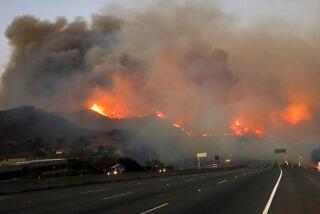Police Deployment Formula Is Part of Why We’re Losing to Crime
- Share via
Is there an alternative to a property-tax increase in a single Los Angeles City Council district in order to pay for more police protection in that district?
Councilman Robert Farrell doesn’t think so. Farrell wants his South-Central area constituents to pay extra taxes for more police to fight drug dealers and violent crime there. Voters in the district, mostly lower-income blacks and Latinos with a mix of Asians and whites, will make a decision in the June election.
As we should well know, all of Los Angeles needs more police. How, then, does a city with too few police officers protect its residents against more aggressive drug dealers and violent criminals?
One option is police saturation of high crime areas for short durations. But these temporary, highly publicized squads of extra police are not a long-term solution. Criminals return when the police leave.
Another option is to pay police officers an overtime bonus for working extra hours. This, too, is a temporary stopgap.
What could be, and should be, changed is the special deployment formula that the Police Commission uses to make area assignments.
We in the United Neighborhoods Organization object strongly to the current formula, which hurts low-income, inner-city neighborhoods.
Rich areas get more police protection than do poor areas because the formula for deployment is based on the value of the loss suffered, not the violence of the crime. It favors people who have property insurance and hurts those who either cannot afford it or who fear retaliation by gangs and so are less likely to report theft to the police. Furthermore, the formula does not factor in known crime spots like liquor stores, housing projects, motels used for prostitution and known drug-dealing hangouts.
We condemn the formula for not giving special value to human life. The formula doesn’t put more police in the areas with more violence. Instead, it treats the loss of a human life the same as a property loss. As a result, the theft of a fancy sports car in one area counts the same as a murder, rape, assault or robbery in another.
We also oppose the formula for not counting residents who don’t report crimes because of their immigration status. Estimates are that more than 1 million undocumented immigrants and refugees live in Los Angeles County--most of them in the city. Crimes go unreported when the victims fear possible deportation from contact with police authorities.
And the formula does not evaluate the “product” of police work. For instance, it does not factor in police response time, nor does it consider results of community cooperation and related increases or decreases in crime.
For the past three years UNO and the South-Central Organizing Committee have been pushing for a new city-wide approach to police deployment. Two years ago the City Council joined UNO, SCOC and other allies in calling for a study of police deployment. Police Chief Daryl F. Gates did not oppose the study, but neither would he admit that there was anything wrong with the formula.
In the meantime, city voters have twice rejected more taxes to pay for more police. The two ballot propositions for tax increases were presented to city voters without changes in the police deployment formula. We continueto insist that the formula be changed. But those changes must be fair to all city neighborhoods. To ensure fairness, we want full public discussion of police deployment, not a secret study behind closed doors at City Hall.
Yes, an alternative to the Farrell single-district tax plan is available. Since druglords operate citywide, not in one or two isolated neighborhoods, a practical plan must encompass all of Los Angeles. At best, the Farrell plan, if adopted, could rotate drug dealers in a moving van from one city area to another. But that prospect is potentially too divisive and self-defeating. The city needs a police deployment plan that is fair, that has broad public support and that has enough resources to do the job. Narrow, limited skirmishes against crime don’t work; neither does unfair deployment of not enough police.
The Police Commission must stop dragging its feet on its overdue study of deployment. The Farrell tax plan was born out of frustration that more police were not available to fight drug dealers and gangs in his district.The Police Commission is not much help. No wonder the city is distracted by unworkable tax schemes while it loses the war against crime.
More to Read
Sign up for Essential California
The most important California stories and recommendations in your inbox every morning.
You may occasionally receive promotional content from the Los Angeles Times.










